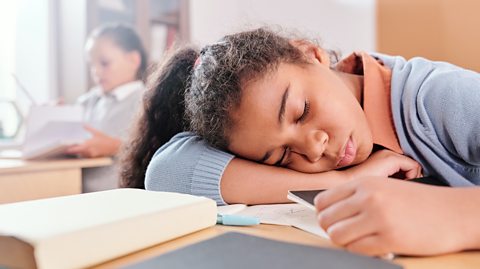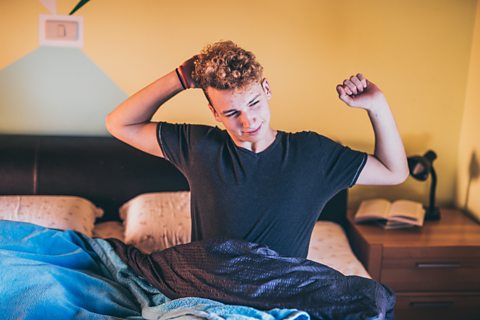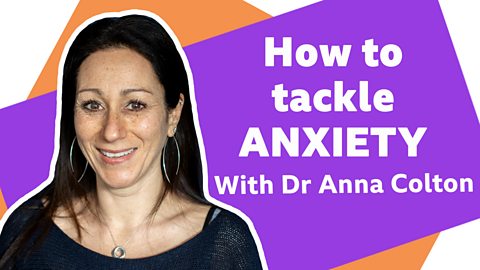It's the age-old struggle: getting your teen to go to bed at night and getting them out of bed in the morning. But what is it about teenagers and sleep? Is it just laziness or is it biology?
Bez and his son Arlo chat about their relationship with sleep as teenagers and the struggle of waking up for school.
Psychologist Anjula Mutanda explains what's going on when teens sleep and why getting them up can be such a battle.
The science - sleep as a teenager.
Sleep is important for all of us but even more so for teens. But what's going on when we're asleep and why is it so important?
- During sleep the brain works to sort out information and memories from the day.
- The pituitary gland releases growth hormone for growth and repair, especially important for teens going through puberty.
- At night the level of stress hormone cortisol are lowered and just before sleep the protein melatonin is released to aid sleep.
- In teenagers this shift in hormone levels is delayed, making them prone to go to sleep later and wake up later. Because melatonin is released later in teens they aren't feeling sleepy until nearer midnight, because their brain hasn't been notified that it's time to sleep.
These biological factors pair with environmental factors such as:
- Early school starts
- Demanding workloads
- Anxiety and worries
- Friends up and online late at night
All this combined makes it a real challenge for teens to get to bed early and wake up in the morning.



Anjula's advice:
It is important to spot signs of disrupted sleep. Knowing your child's normal rhythm is key to noticing when something may be going wrong.
Signs of disrupted sleep in your teenager include:
- Becoming more grumpy or irritable
- Being less focused
- Frequently waking up on the wrong side of the bed
- A drop in quality of work
- Grades slipping
- Less attention to detail
- Struggle to concentrate
- Falling asleep in lessons.
Helping your teen create good sleep habits can help to get your teen get back on track and feel more like themselves.


- Be understanding. There's a lot going on in a teenager's life that makes it tricky to get a good night sleep. Making them feel guilty won't encourage them to make real changes.
- Allow them to sleep in more on the weekends.
- Get the whole household into the habit of limiting screens in the bedroom as the blue light interferes with sleep. If everyone does it, then it will feel fair to your teenager.
- Encourage your teen to get fresh air and exercise at least three hours a week. This can help to improve sleep and make them more tired before bed.
- Suggest your teen writes down any problems they may be facing so that they don't go to bed worried.

Scientific advice by Dr Emma Parish, paediatric and adolescent consultant at Evelina London Children’s Hospital.
Dr Michael Mosley has written these five tips for helping your kids sleep well for the Parents' Toolkit.
For more on the teenage brain, this episode of the BBC World Service podcast Deeply Human meets teens and a brain scientist to find out why the rollercoaster highs and lows of teenage life might be good for us.

If your child needs further support
Think about seeking professional help for your teen if any of these sleep issues are causing concern:
- Unexpectedly falling asleep in the daytime
- Lots of daytime napping and poor or no sleep overnight (called sleep reversal)
- Difficulty falling asleep every night despite doing all the suggestions for more than 2 weeks (good sleep is a habit)
- Change in mood or behaviour suggestive of something else causing sleep disturbance (depression, drug use, alcohol misuse)
If you are looking for help for your teenager for sleeping problems, Guy's and St Thomas' NHS Foundation Trust have produced this guide
If your child is in need of in-the-moment support they can contact Childline, where they can speak to a counsellor. Their lines are open 24 hours a day, 7 days a week.
Mental health charity Young Minds have this quick 'help finder' to guide young people and parents to information and support.
There are more links to helpful organisations on BBC Action Line.
There is more advice and information for parents of teens on the Parents' Toolkit here.

More from BBC Bitesize Parents' Toolkit…
Parents' Toolkit
Fun activities, real-life stories, wellbeing support and loads of helpful advice - we're here for you and your child.

How to talk to your teenager about the invasion of Ukraine
Tips from a clinical psychologist on how you can talk to your teen about war and help them to manage any anxieties.

Michael Mosley: Five tips for helping your kids sleep well
Dr Michael Mosley offers advice on improving health and concentration through better sleep habits. Here are his tips for parents to help their kids.

How to tackle anxiety with Dr Anna
Calming techniques to help parents and children manage their anxiety.

How to manage your child’s online world without clashing
Children and teens spend lots of time online for school and leisure, which can be a worry for parents. Here's some advice on managing your child’s screen time.

